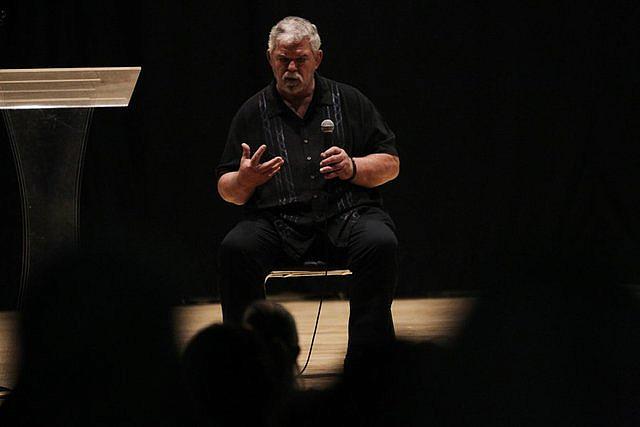In San Antonio, crisis center offers hand to those in need of help
This series of articles examines the fragmented and overwhelmed mental health system in Shasta County and how its failings impact patients and public safety, and contribute to the problem of homelessness. The project was produced through a California Health Journalism Fellowship, a program of the USC Annenberg School for Communication and Journalism.
Other stories in this series include:
Limited care available for mental health patients in rural Shasta County
Managing mental illness in rural Northern California: Two women share their stories
Untreated, severe mental illness at root of substance abuse and crime problems
Mental health care in rural northern California: Fated for failure?

Leon Evans, president and CEO of the Center for Healthcare Services in San Antonio, Texas, discusses how he helped lead the effort to create the Restoration Center, a one-stop facility for those with mental illness during a forum co-hosted in September by The Women’s Fund and the Record Searchlight at the McLaughlin Auditorium at Sequoia Middle School.
REDDING, California - On a sunny September day in Redding, Leon Evans, a Texas mental health center developer and CEO, took the stage at Sequoia Middle School and told a large crowd how the mental health and criminal justice worlds came to overlap.
People who aren’t getting the help they need turn to drugs or alcohol to numb their pain, and that often leads to arrest, he said — it’s a cycle that not only criminalizes people with mental illnesses, but costs society millions of dollars annually.
“You’ve lost that lifetime of productivity and happiness,” he said.
But Evans’ message was not just informational — it was a message of hope.
At his Restoration Center in San Antonio, law enforcement officers are trained to de-escalate people so they can get the help they need and stay out of trouble at the same time. The center provides detox, sobering and mental health crisis intervention, and minor medical emergency services to about 25,000 people each year. They’re people who would have probably gone to jail otherwise, Evans said.
Employees are so skilled at calming people down that “we reject hardly anybody,” Evans said.
And since the first crisis unit opened in 2003, Evans said, San Antonio’s downtown homeless population dropped 85 percent.
Shasta County officials, asked about their thoughts on a similar facility here, generally expressed interest in its concept but questioned whether the county could afford it.
“It’s a great example,” said Leonard Moty, a Shasta County supervisor and former Redding police chief. “The obvious question ... was the cost.”
Moty noted that Evans had an $82 million grant to help fund the Restoration Center.
But he acknowledged the county’s need to change something.
“We have to find some other ways to deal with this situation,” he said. “Without the services available ... they fall through the cracks, and eventually they fall into the criminal justice world, because they keep committing some crime unknowingly.”
Evans ended his talk by telling the audience to find its own way of solving the problem without necessarily putting up a duplicate of San Antonio’s.
“There’s just so much you can do as a community,” he said.
[This story was originally published by Record Searchlight.]

